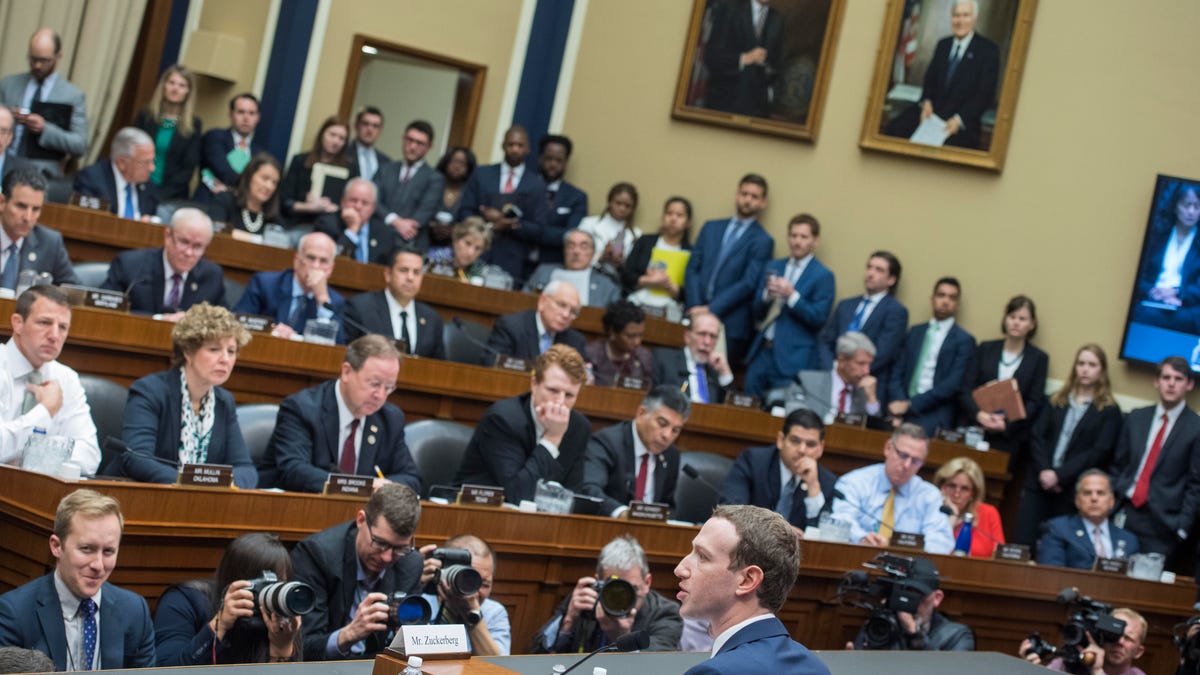Lawmakers want Facebook's help providing rural broadband
Mark Zuckerberg may have been in Washington to talk about privacy, but several lawmakers asked to hear more about Facebook's initiatives to bring broadband to rural areas.

Facebook CEO Mark Zuckerberg testifies before a House Energy and Commerce Committee on the protection of user data on April 11, 2018.
Mark Zuckerberg appeared on Capitol Hill this week to talk about data privacy. But several lawmakers from rural parts of the country used the opportunity to ask the Facebook CEO to help bring high-speed internet access to their rural constituents.
Facebook has rolled out several initiatives to bring low-cost and free broadband to hard to reach areas of the world, such as India and Africa. Now US lawmakers say they'd like to talk to Zuckerberg about focusing those efforts closer to home.
"Next time you visit [West Virgnia], if you would please bring some fiber, because we don't have connectivity in our rural areas like we really need, and Facebook could really help us with that," Sen. Shelley Moore Capito, a Republican from West Virginia, said during Tuesday's Senate committee hearing.
Zuckerberg made his appearance on Capitol Hill Tuesday in front of a joint Senate Judiciary and Commerce Committee hearing. He returned Wednesday to take questions from the House Energy and Commerce Committee. Zuckerberg was asked to appear before Congress in the wake of the the Cambridge Analytica scandal. Cambridge Analytica, a political consultancy with ties to the Trump presidential campaign, obtained data on up to 87 million Facebook users without their permission.
The more than 10 hours of testimony largely focused on privacy concerns and how Facebook handles users' data. But several lawmakers representing rural regions followed Capito's lead Wednesday during the House Energy and Commerce Committee. Rep. Morgan Griffith, a Republican from Virginia, said he'd also like to talk to Zuckerberg about bringing high-speed connectivity to parts of his state.
"My district is very similar to West Virginia as it borders it," he said. "We have a lot of rural areas. Can you also agree, yes or no, to update me on that when the information is available?"
Zuckerberg said he would. And he explained some of the initiatives the company has been working on.
"Unfortunately, too much of the internet infrastructure today is too expensive for the current business models of carriers to support a lot of rural communities with the quality of service that they deserve," Zuckerberg said. "So we are building a number of specific technologies from planes that can beam down internet access to repeaters and mesh networks to make it so all of these communities can be served."
At least two other congressman during the hearing -- Bill Johnson, a Republican from Ohio, and Dave Loebsack, a Democrat from Iowa -- also expressed interest in getting more information from Zuckerberg about bringing broadband to hard reach areas of their states.
In 2013, Facebook launched its internet.org initiative to connect the world's 4.5 billion unconnected people to the internet. It's partnered with wireless providers throughout the world and experimented with different technologies to make this happen, including the use of millimeter-wave wireless technologies and low-power base stations.
It partnered with Eutelsat, a European satellite provider to bring internet access across Africa via satellite. But that plan literally blew up as the satellite it was supposed to use was onboard the Space X rocket that exploded on the launch pad in 2016. It's also tested delivering broadband via drones, and it's collaborated with other tech firms through the Telecom Infra Project in an effort to accelerate development of internet infrastructure in rural areas.
While Facebook's focus to date has been around getting people in developing regions connected, there are still plenty of people the US who need broadband.
The Federal Communications Commission estimates 39 percent of people living in rural regions don't have access to broadband, compared with just 4 percent of people in cities. The FCC is led by Republican Chairman Ajit Pai, who is from rural Kansas and has been working to make it easier for companies to cut through red tape in order to deploy more network infrastructure in rural areas. President Donald Trump has also talked about the need for better broadband in rural America, although he's stopped short of allocating funding to support these initiatives.
While lawmakers may see Facebook as a potential partner in helping offset the cost of deploying broadband in sparsely populated regions, the subsidized price of internet access likely won't come without trade-offs. In the 63 countries around the world where Facebook is subsidizing the cost of internet access, it offers a service called Free Basics, which is a slimmed-down, Facebook-centric version of the internet supported by advertising.
Critics have complained that this service violates basic net neutrality principles, which ensure users can get to any legal content or service on the internet they want. The service was banned in India for violating net neutrality rules. That could prove to be too heavy a price for some states, which have already begun passing their own net neutrality protections after the FCC last year gutted rules passed in 2015, meant to protect a free and open internet.
Cambridge Analytica: Everything you need to know about Facebook's data mining scandal.
The Smartest Stuff: Innovators are thinking up new ways to make you, and the things around you, smarter.

